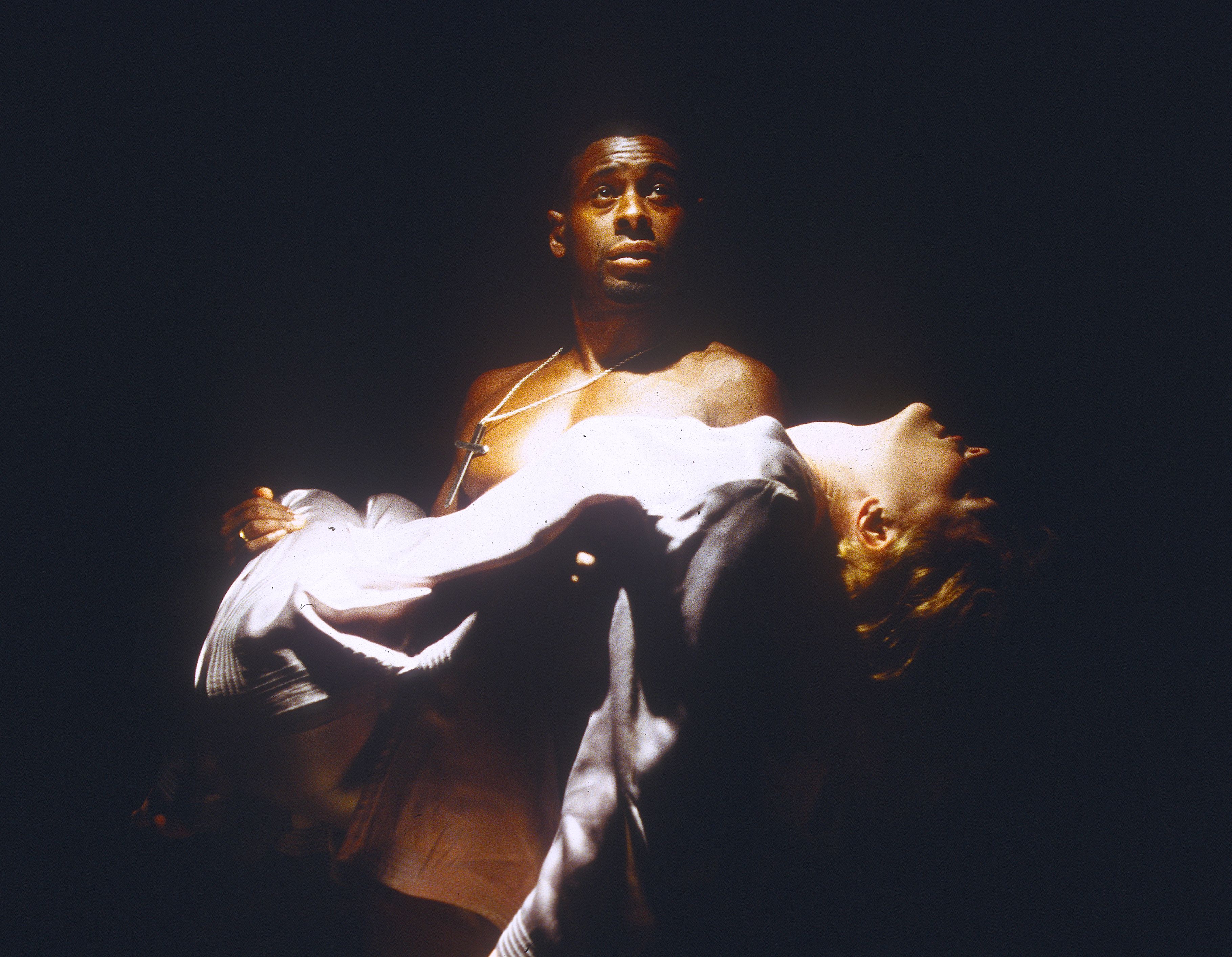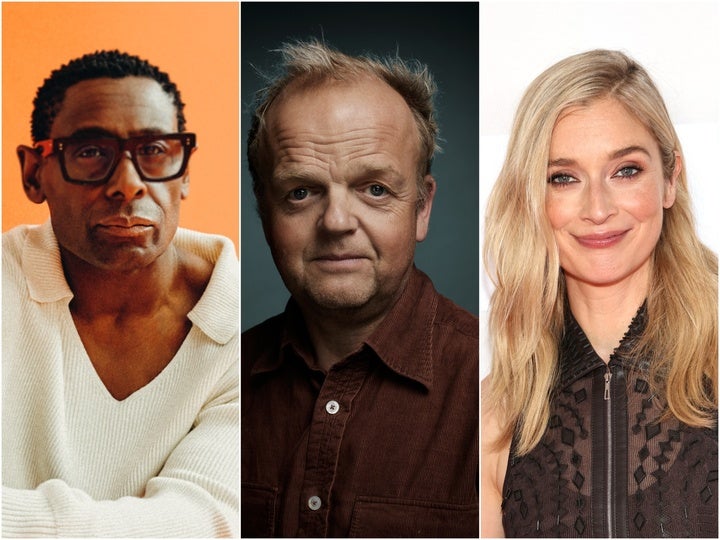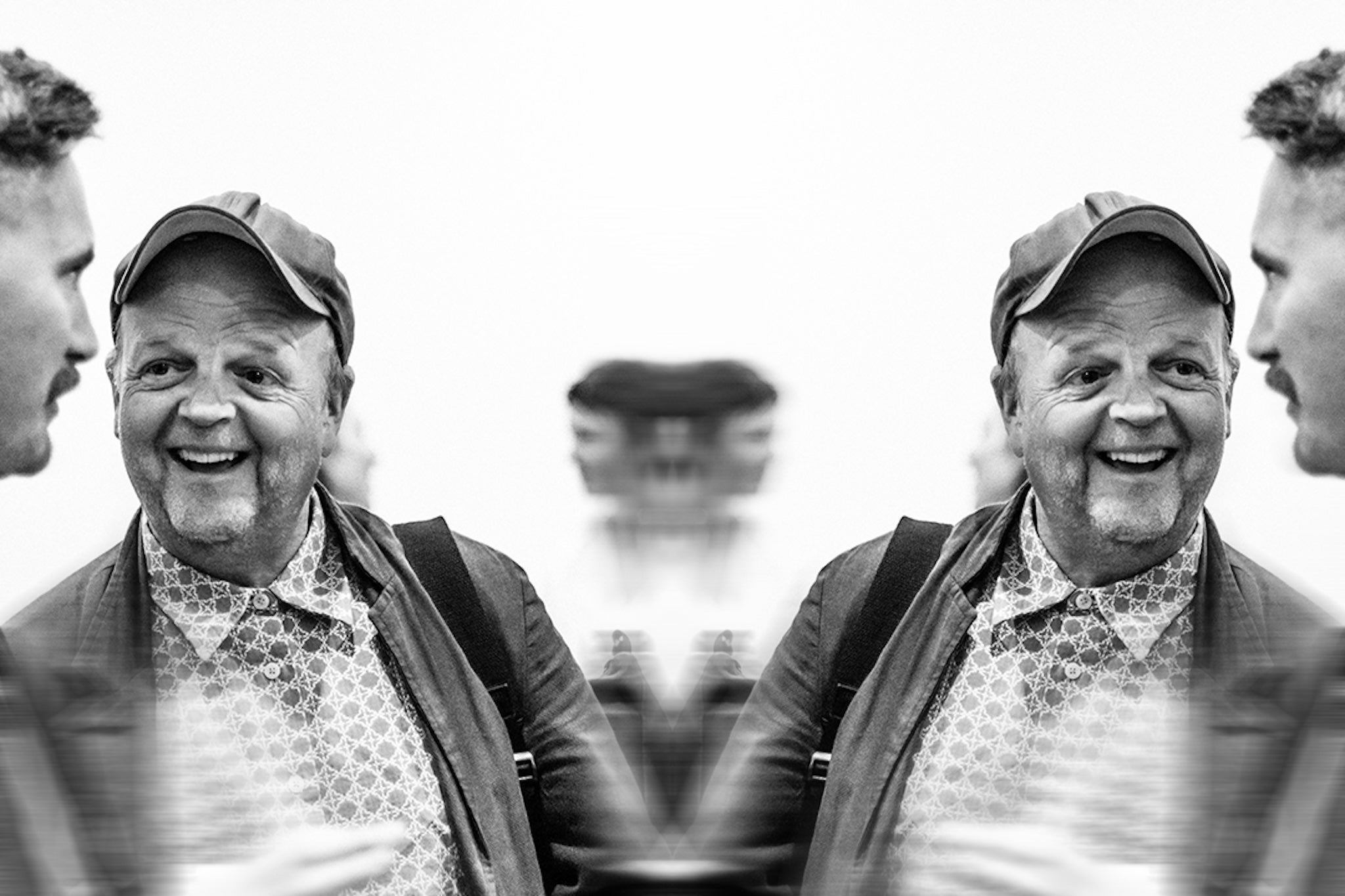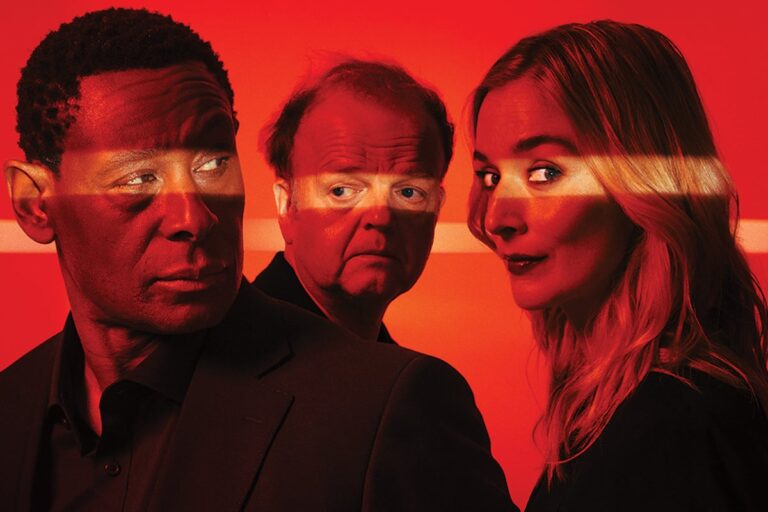The three of them file into the restaurant looking like soldiers emerging from the fog of war. David Harewood leads the way, flanked by Toby Jones and Caitlin FitzGerald, bringing up the rear. They appear bleary-eyed. A little shell-shocked. “It’s alright when you’re in the tunnel of rehearsals during the week, but then the weekend comes and you sort of collapse and have to climb a ladder to get back into that state again,” huffs Jones, clawing at the air. It’s Monday blues times a million.
To be fair, Othello is taxing at the best of times. Shakespeare’s tragedy of a noble Black general goaded into killing his wife by his machiavellian ensign, it’s full of violence, racism, murder, and misogyny. Watching the play can feel like an emotional sandblasting; acting in it, I’m sure, is something else altogether. Luckily, they have a “drama therapist” on hand for this new production directed by Tom Morris, says Harewood. He last played the titular role in 1997, becoming the first Black actor to portray Othello at the National. This time, he does so opposite Jones’s Iago, FitzGerald’s Desdemona – and Samantha, their drama therapist.
“She helps us realise those darker moments in the room,” says Harewood – but also, Jones adds, helps them to process it afterwards too. “It’s odd because I think, what have people done previously to this, you know? And I guess the answer is, go to the pub!” They all laugh. “I mean, there is a bar backstage at the National,” quips Fitzgerald.
We skip the drinks today. The trio are on lunch break from rehearsals and the clock is ticking, so in quick succession: a medium rare steak with truffle fries for Harewood, and two Green Goddess salads for FitzGerald and Jones. I go for the Caesar. “It’s really delicious,” FitzGerald assures me. “I’d order the same if I didn’t have to smooch David.” Harewood laughs, pointing out the fact she had a Thai green curry before their first kiss. “But I warned you and I ate about 45 Listerine strips,” she says. “My mouth was on fire!”
Rather than sink pints in silence, the trio are finding the presence of a drama therapist invaluable. Though Jones, a beloved telly fixture most recently seen in ITV’s phone hacking drama The Hack, is the first to admit he wasn’t sold on the idea initially. “I thought, what is she going to do? It was so unusual. The way my generation was trained was so different; you had to learn to be tough and to be tough with each other,” he says. “But then there was misogyny as a result.”
I have been having nightmares about men killing me so maybe I need to work with the drama therapist a little more
Caitlin FitzGerald
Like Jones, Harewood is best known for his superb small-screen work. Also like Jones, he is 59 and with enough road beneath his feet to remember a time without any such safeguarding. “There is a fine line between coddling actors and allowing them to talk about when they are uncomfortable,” he says. “I certainly grew up in a generation when there was none of that and I think I’ve suffered and benefited.”
As president of London’s Rada drama school, Harewood is in a better position than most to remark on his peers in training. “I do think young actors now are a bit mollycoddled. They might say, ‘Oh, I don’t want to do that. It makes me uncomfortable,’ whereas I think, and maybe this is just the generation I grew up in, but sometimes you do have to feel uncomfortable.” That’s why FitzGerald became an actor, she says, to feel uncomfortable.

But the point of a drama therapist isn’t round-the-clock comfort; it’s to give actors a long enough tether to explore, while knowing they can find their way back. “You can go to these dark, murky, messy places and then hopefully leave it behind at the end of the day,” says FitzGerald. “Speaking for myself, I need to leave the theatre not feeling like a victim.” That said, she jokes, “I have been having nightmares about men killing me, so maybe I need to work with her a little more.”
FitzGerald tells us a story she’d heard about Laurence Olivier and Maggie Smith when they did Othello at the Old Vic in 1964; Smith apparently grew so fed up with Olivier’s diva behaviour that during one of their fight scenes she dragged her fingers down his black-painted face, so that Olivier had to perform the rest of it looking like a kid with tiger face paint. I tell them of another tale I’d heard in which Olivier, displeased with Smith off stage, had smacked her so hard during one scene that she saw stars. “And that is exactly what happens when you don’t have a drama therapist!” exclaims FitzGerald.
It’s certainly a different world now than when Harewood made history as Othello in 1997. “Crazy it took so long,” he says, shaking his head, “and there were a lot of broadsheet newspapers saying that it was a terrible idea.” How come? “Tradition. Blackface was taken off the television in 1982, but somehow the stage escaped the Blackface [reckoning] and actors were blacking it up right up until the 1990s.”
A brief aside: Harewood makes clear that his comments, seemingly defending the use of Blackface in 2023, were taken out of context. “That was the BBC taking liberties with something I said,” he says now, adding that the ordeal was infuriating. “It was garbage. I had joked that if a white actor wants to play Othello in Blackface, do it and I’ll probably be in the front row laughing my arse off. Of course, that was transposed as ‘David Harewood says white actors can Black up.’” (An addendum was added to the article in question, along with a change in headline.)
The gravity of playing Othello and the responsibility of being the first Black actor at the National to do so were not lost on him back then. “I wanted to play the character with more dignity as a real Black actor rather than a make-believe Black actor,” he says. “I was so concerned with the authenticity, being 100 per cent authentic every minute, every second, every line. And that obviously forced me to push the emotion, push the anger.” He didn’t think twice about meting out that anger on his Desdemona back then, Claire Skinner – to whom, by the way, Harewood would like to “formally apologise” because of all the “screaming and manhandling”.
This time, Harewood says he was scared to even broach that level of toxicity. “I was thinking, can I be that horrible? Am I allowed to be that horrible? Nudging up to that line, I found really uncomfortable.” He’d spent three weeks being “nice and polite David Harewood” and then suddenly he was growling at everyone. “It was very, very uncomfortable to become a monster. It really rattled me, I had to go off in a corner and have a little bit of a sob because of this horribleness that was weighing on me.” With the help of the drama therapist, though, they cracked it, “it became fun to play in that territory”.

“We just scream at each other the whole time now,” grins FitzGerald. Not for nothing does Harewood call FitzGerald “one of the bravest actresses” he’s ever worked with – a compliment she bats off but that he doubles down on: “You are f***ing fearless.”
“F***ing fearless” isn’t the first thing that comes to mind when you think of Desdemona, Othello’s fawning and docile new wife, who is, let’s face it, a bit of a wet blanket. But FitzGerald’s take on the character is far from typical. “My first meeting with Tom [the director], I came in wearing my most badass leather jacket and told him I didn’t want to do pious and virginal and he was like, ‘Great!’” she says. “I feel like I spend most of my career sort of elbowing out and trying to let women have more anger, more voice and agency, and the text on this one really bears it out. And I mean, trying to have a voice in a man’s world is certainly a challenge I know about.”
In many ways, the play’s fulcrum is Othello’s metamorphosis from devoted husband to jealous murderer on a dime. It’s a quicksilver transformation, white hot and slippery. The task of any actor is to make it believable, to embody the thing that already exists in Othello to make his corruption possible. For Harewood, that thing is “insecurity”.
We live in a world where you’ve got to be the alpha male, everyone’s trying to be ‘alpha’
David Harewood
“We live in a world where you’ve got to be the alpha male, everyone’s trying to be ‘alpha’ – and I do a lot of work in the mental health area and you realise that men just don’t talk about their s***. You need to talk about your emotions. It’s so mental that we don’t do it – and we should. What we should really do is gather around, have a cup of tea and a chat, but we don’t and it comes out in aggression, toxicity – ” FitzGerald interjects: “– and killing your wives!”
According to Jones, it’s exactly that lack of communication between men that has made his bighearted comedy Detectorists, about two ordinary blokes in search of treasure, such a hit. “I think a lot of people see a gentleness and a model of male friendship in that show that they yearn for,” he says, crediting his co-star and writer Mackenzie Crook. “I think it really moves people because of that. It’s a very progressive show in that way.”
Jones as Iago is a tour de force of casting. The actor is so often mined for his kindness and perceived benignity that it’s easy to forget his capacity for those more moustache-twirling roles. He was strikingly convincing, for example, as the morally dubious Truman Capote in Infamous and also the psychologically opaque Alfred Hitchcock in The Girl. It has been over a decade since he’s done Shakespeare on stage and Jones is a little daunted by the technical challenge presented by Iago’s fast, fluid speech, or as he put it: “Complete verbal diarrhoea.”

“But then again, I feel intimidated by most jobs nowadays, whereas when I was younger, I would have just done them!” he adds. “Now that I’m older and should think that I know how to do this, I feel exactly the opposite; I don’t even know if I can do it any more!” But that’s a nice feeling, isn’t it? To feel so invested in his work so late in his life? “Ah, yes, being as ancient as I am,” he laughs, cupping his hand around his ear and joking that he’s hard of hearing: “You’ll have to repeat that.”
Over the decades, there have been countless iterations of Othello. Productions set in the blitz of modern-day warfare, amid the fluorescent bureaucracy of a 1930s office, and even in the galaxies of outer space. The details surrounding this one, though, are hush-hush. “It’s sort of out of time and place,” Jones says, laughing at how unhelpful he sounds. “There are echoes of today throughout the play,” ventures Harewood, who is a smidge more forthcoming. “It’s a place where racism exists, but a person can succeed within that racist society so pretty much like today’s society. And there are calls of ‘send them back’, which is, of course, very much reflective of today.”
What they will say is that their take on Shakespeare’s tragedy hits the beats of a modern thriller more than it does a 400-year-old text. What audiences take from it is up to them, says Jones. “All I want is the same thing that I want from anything: I want them to be totally entertained.”
At the Theatre Royal Haymarket, London, until 17 January 2026; othelloonstage.com


